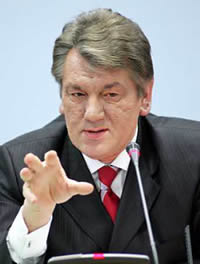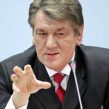
GUAM IN KYIV: ANOTHER SUMMIT OF GOOD INTENTIONS
Publication: Eurasia Daily Monitor Volume: 3 Issue: 102
By:

Presidents Ilham Aliyev of Azerbaijan, Mikheil Saakashvili of Georgia, Vladimir Voronin of Moldova, and Viktor Yushchenko of Ukraine met on May 23 in Kyiv for another effort to revitalize the GUAM group of countries. Lithuanian President Valdas Adamkus attended as well, in line with his country’s active role in Baltic-Black Sea initiatives. Adamkus expressed his “deep conviction that our countries will ultimately meet inside the Euro-Atlantic organizations as members” (1 + 1 TV [Kyiv], May 23).
GUAM’s previous summit, held in April 2005 in Chisinau and dubbed the “GUAM revival summit,” fell short of that aim, despite the Moldovan chairmanship’s diligent efforts during the intervening year. Ukraine took over the rotating chairmanship at this summit.
The Kyiv summit formally institutionalized GUAM and turned it from a group of countries into an international organization, henceforth renamed “Organization for Democracy and Economic Development — GUAM.” The summit’s Declaration reaffirms the countries’ known goals as “the creation of a regional space of democracy, security, and stable economic and social development,” a determination to pursue their common European choice, and to pursue policies to strengthen relations with the European Union and NATO.
The presidents signed the Organization’s charter (to be ratified by the four parliaments) and created new policy-making and executive bodies. These are: the Council of Heads of State, Council of Ministers of Foreign Affairs, and Council of National Coordinators (these are deputy ministers responsible for implementation of GUAM policy decisions within the respective national governments). These Councils are to meet at annual, six-month, and three-month intervals, respectively. The presidents also approved the creation of the Organization’s Permanent Secretariat, based in Kyiv.
In addition, the Organization plans to develop a mutually accessible database on terrorism, organized crime, drug trafficking, and related challenges. This “virtual information center” shall be mutually accessible to the four countries’ intelligence and law-enforcement agencies. Further plans for institutionalization envisage a GUAM energy security council to be created within one month, according to Ukrainian Fuel and Energy Minister Ivan Plachkov. If so, this council would need a more effective Ukrainian minister than Plachkov, who has lost credibility within Ukraine and internationally through mismanagement — along with Naftohaz Ukrainy chairman Oleksiy Ivchenko — of Kyiv’s energy policy.
The new Organization is open — as was the GUAM group — to accession by countries that share the organization’s goals. During the summit, Voronin suggested that Romania and Bulgaria could be the most suitable candidate countries. Their accession would substantially increase the Organization’s ability to promote security and energy transport initiatives in the Black Sea region.
The presidents signed a protocol on entry into force of the earlier agreement to create a GUAM Free-Trade Zone throughout the four countries’ territories. According to Yushchenko, the free-trade zone is “in effect as of today de jure and will go into effect de facto in no more than 30 days.” While recognizing that the free-trade zone “will not work without unification of tariff policies and customs procedures,” Yushchenko unrealistically expressed optimism that this can be done by the member countries within one month and instructed Ukraine’s customs and border guard services to do so within that timeline (Interfax-Ukraine, May 23).
At the same time, Minister of Foreign Affairs Borys Tarasyuk reserved Ukraine’s option to join the Single Economic Space (SES) of Russia, Belarus, and Kazakhstan, in the admittedly unlikely event that the SES ultimately creates a free-trade zone (Channel 5 TV [Kyiv], May 23). Tarasyuk’s caution makes sense, because access to the Russian market is incomparably more important to Ukraine than access to GUAM markets. It seems far from clear, in any case, how Kyiv’s abiding interest in the SES can be reconciled with the GUAM free-trade zone project or with preferences on European Union markets, which all GUAM countries seek.
For his part, Voronin proposed that the Secretariat be tasked with preparing an agreement on the Organization’s cooperation with the EU. Such an agreement should focus on developing energy and transport projects (Moldpres, May 23).
In his speech to the summit, Saakashvili underscored the political expectations attached to the GUAM Organization and to interact with the West on that basis: “This is necessary economically and vitally necessary, like the air, politically. Such meetings help our countries to become part of the democratic world, of the civilized system of international relations.” GUAM may indeed be a case in which such intangible — though real — benefits outweigh the quantifiable — though elusive — ones.




